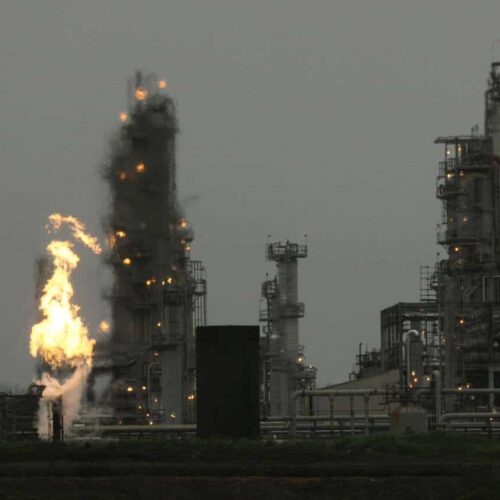Introduction
A major U.S. refinery workers’ union says it will make prevention of catastrophic accidents the centerpiece of upcoming contract talks with oil companies. The union abandoned demands for additional safety measures in their last negotiation.
The United Steelworkers, which represents 30,000 workers at petrochemical facilities nationwide, crafted its bargaining position in response to the sorts of disasters and near-misses profiled in the Fueling Fears series by the Center for Public Integrity’s iWatch News.
The series has found that the nation’s aging refineries are plagued by recurring equipment failures and sometimes-fatal fires, explosions and chemical releases that in many cases could have been prevented.
Specifically, the union is focusing on “process safety management” – steps that refineries can take to reduce the risk of catastrophic accidents, including tough self-inspections of equipment and repairing or replacing it when necessary.
“We’ve got time bombs out there, and we want to have a discussion with [oil companies] about it,” United Steelworkers International Vice President Gary Beevers, lead negotiator for the union, said last week. “We’ve got problems in these old refineries and we need changes…Partnering with this industry to make these refineries safer is my number one goal.”
The 148 active U.S. refineries have been plagued by process safety lapses in recent years. While injury rates remain lower than in many other heavy industries, 44 refinery workers died on the job in the past decade, an iWatch News investigation found. And of 7,600 accidental chemical releases companies reported to the U.S. Coast Guard’s National Response Center in the past decade, roughly half were due to equipment failure, according to the report.
The American Petroleum Institute, an oil industry lobby group, has said it instituted new process safety standards in April 2010. API did not respond to requests for a comment on the upcoming negotiation.
The Steelworkers union approved its National Oil Bargaining Policy at an annual conference in Dallas on Sept. 23. Details of the policy have not been made public. Union leaders told iWatch News it includes provisions that call for the hiring of new process safety inspectors, as well as pay raises for refinery workers. “We always look for a wage increase. We think we’re entitled to it based on the profits of this industry,” Beevers said.
Union locals received the policy last week. They have little more than a month to decide on whether to ratify the measure, which would also give Beevers the authority to lead national or targeted strikes. The locals’ contracts will begin to expire on Jan. 31, 2012.
At the beginning of next year, Beevers plans to begin talks with Royal Dutch Shell Plc., the lead negotiator for industry. Other U.S. refiners will largely base their contracts with the Steelworkers on the deal the union works out with Shell.
Shell’s objective in the negotiations is to reach a resolution “that is satisfactory to its management and the union,” spokeswoman Kayla Macke said in an emailed statement.
The union pushed for the similar safety improvements during the last contract negotiation in 2009, Beevers noted. “What we didn’t anticipate was the economy falling through the roof. When that happened, it took away a lot of our bargaining strength,” he said.
Despite the recession, 2009 contracts gave union workers a 3 percent raise and, in exchange for higher healthcare costs, $2,500 bonuses.
While the economy has not improved dramatically since then, union leaders are vowing to push for safety. “We must have meaningful and enforceable safety provisions if we are going to save lives, and we are prepared to strike, if necessary, to get that,” Beevers said in a statement announcing the new bargaining policy.
Reducing refinery fires are an important component of improving process safety. Since the beginning of the previous contract through September, refineries reported 131 fires to the Department of Energy. That’s amounts to at least one refinery fire per week.
In April 2010, an explosion at Tesoro Corp.’s refinery in Anacortes, Wash., killed seven employees. The cause was a 38-year-old heat exchanger that had not been properly inspected in more than a decade, according to the Washington Department of Labor & Industries. The aging heat exchanger burst, engulfing the workers in a fireball of liquid hydrocarbons, killing four instantly and melting aluminum up to 100 feet away, according to a February iWatch News report.
The refinery operator denies that inadequate inspections or maintenance contributed to the disaster. “I cannot emphasize strongly enough that safety is an integral part of Tesoro’s business, and is not to be compromised for any reason,” company spokesman Mike Marcy said in an email last week.
State regulators slapped Tesoro with a $2.4 million fine for 44 alleged violations. Marcy confirmed that the company is appealing the penalties. As a result, it is not yet required to fix potential hazards regulators may have identified in their review of the accident.
But that will soon change for refineries in Washington State. A bill signed into law a year after the disaster forces employers to make safety fixes immediately, regardless of whether they dispute regulators’ findings.
Rules implementing the law will likely be completed by early 2012, according to the state’s Department of Labor & Industries. Steve Garey, a worker at the Anacortes refinery and president of Steelworkers Local 12-591, has had a hand in writing the rules. Garey said he is largely satisfied with the direction the rulemaking is taking.
Even without the new regulations in place, Garey said, he has sensed a change at Anacortes.
“There has been an unprecedented level of inspections going on,” he said. “[Tesoro] is taking equipment out of service if it needs to be taken out of service. They’re not taking chances. They’re doing the right thing.”
But, Garey wonders, “will they continue to do so when they don’t have so many outsiders looking over their shoulder?”


Join the conversation
Show Comments